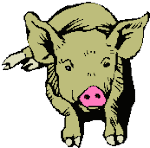The latest report from Denmark starts with some alarming news, and then pours reassurance.
Unlike Britain, where MRSA st398 remains a state secret and the government still has not admitted that the pigs have or carry MRSA, the Danes come clean by admitting they have widespread MRSA in their pigs and that it is getting worse. They then rather spoil their candour by playing down the human risks and arresting journalists identifying infected farms.
But rather spoiling the complacent picture, Denmark has had an outbreak of MRSA st398 reported this year in a care home with a human death - Danish Health Ministry report is here
Extracts from the Statens Serum Institut report follows, as always read in full here.
MRSA CC398 account for an
increasing proportion of MRSA-infected
June
11, 2014
While pig MRSA CC398 in 2007
accounted for only 2 percent of all reported MRSA in Denmark, is the so far
more than 35 percent this year. The
vast majority of these cases are carriers of the bacteria and have no symptoms
of a staphylococcal infection, and only a few get serious illness caused by
infection.
During
the period 2007-2013, SSI received a total of 8375 MRSA isolates for
microbiological characterization, and 15% of these were of the type CC398,
which can be transmitted from pigs to humans. Both
the number and proportion of CC398 has increased over this period. Thus, only 2% CC398 in 2007 while this
share in 2013 had risen to 31%. The
figures for January April 2014 indicate that this trend will continue, as so
far received 784 MRSA strains in 2014 accounting for 36% CC398.
Part
of the increase is due to more of those infected are discovered. Today, all patients being admitted to
hospital asked if they work with pigs or live on a farm with pigs crew. If they do, they examined for MRSA,
although they do not have evidence of infection with the bacterium. This can be attributed to the Board of
Health in 2012 issued a revised MRSA manual, where contact with pigs was
introduced as a risk situation for MRSA infection...
